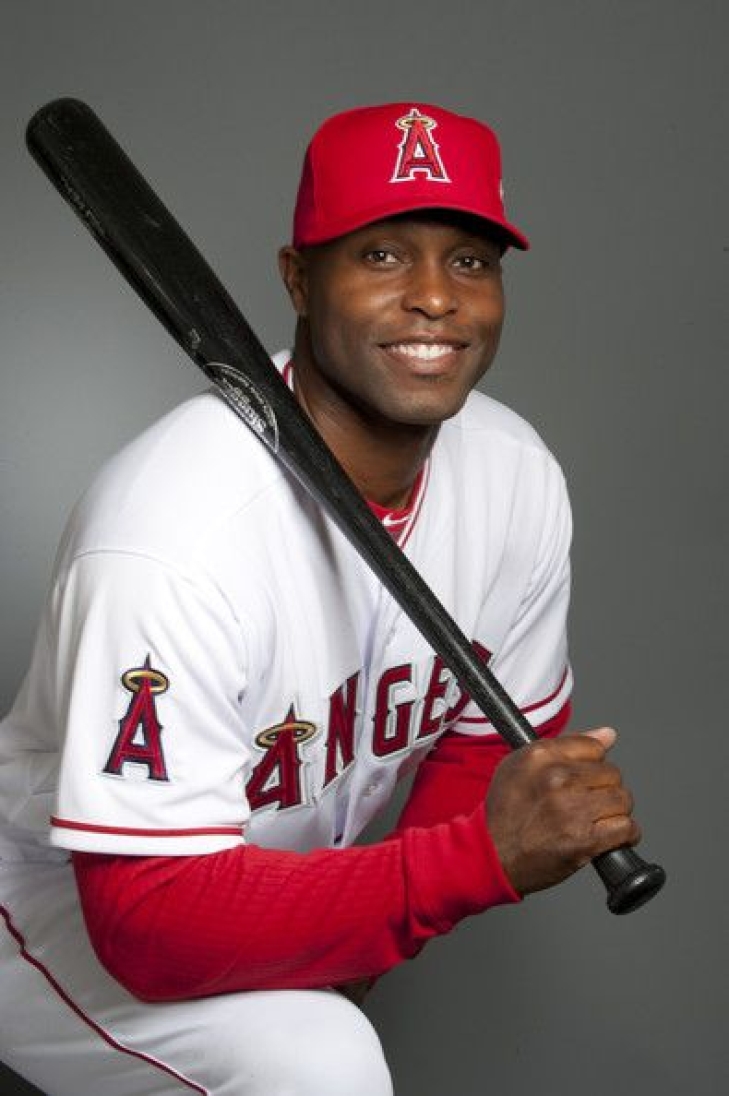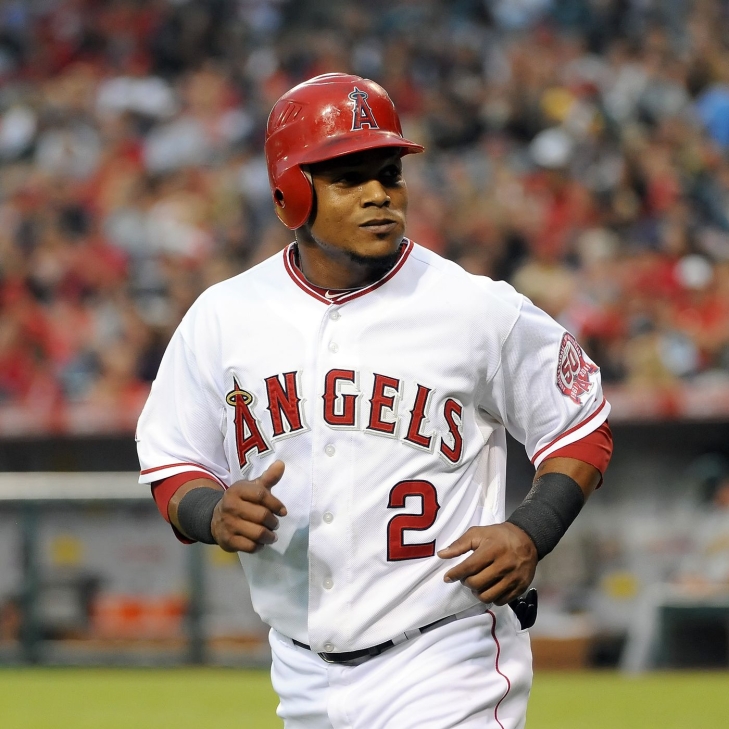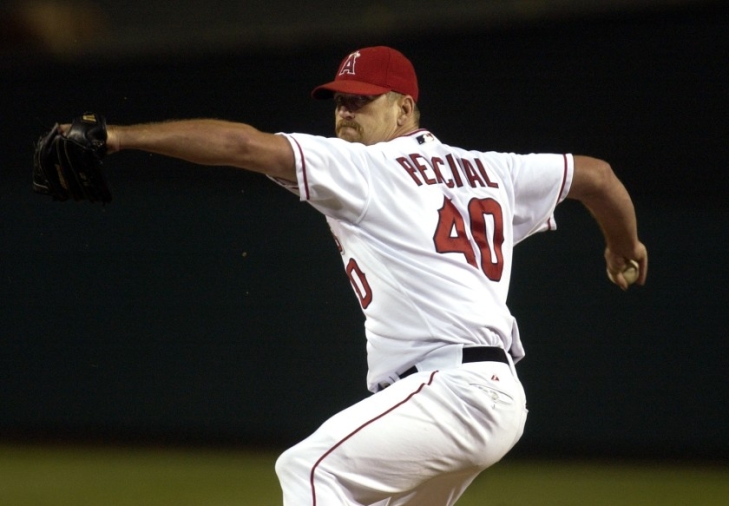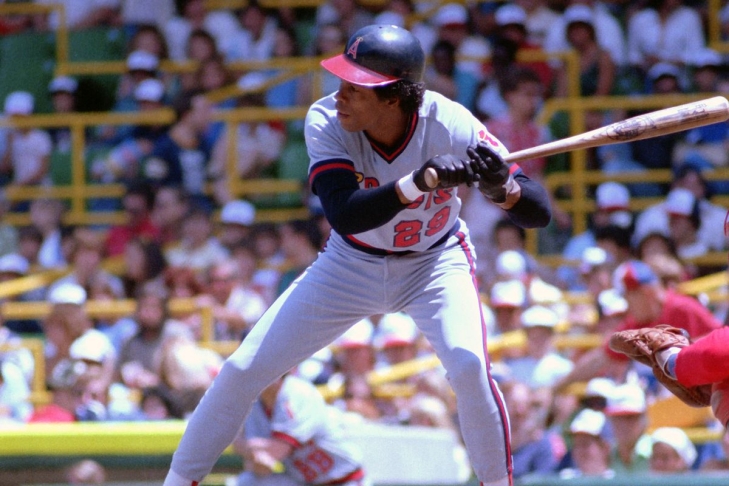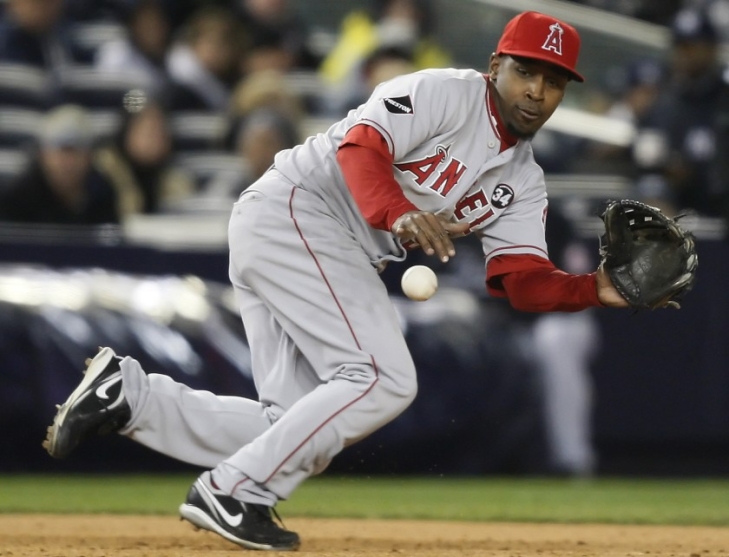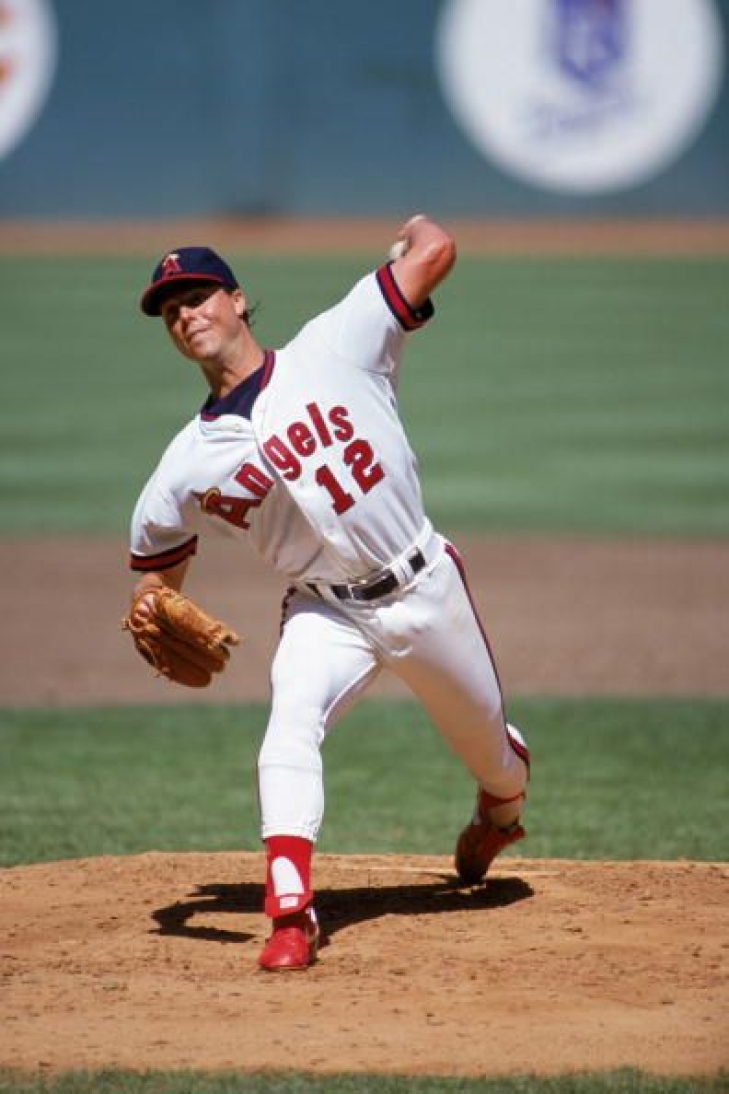38. Albie Pearson
Albie Pearson was the American League Rookie of the Year in 1958 with Washington, but his arrival to the Angels in 1961 as part of the Expansion Draft was not met with a lot of fanfare as his two previous years with the Senators and Orioles were not great. With Los Angeles, he was able to recapture some of that rookie magic, albeit for a brief time.
Standing at only 5' 5" and the shortest man in baseball at the time, Pearson was a Major League starter again, and the Outfielder batted .288 with a .420 OBP in his 1961 comeback season. He followed that with a league-leading 115 Runs Scored in 1962 and was an All-Star in 1963, posting career-highs in Hits (176) and Batting Average (.304). After an injury-plagued year in 1964, Pearson declined and was released in 1966.
With the Angels, Pearson had 618 Hits with a Batting Average of .275.
31. Adam Kennedy
After 33 Games with St. Louis, Adam Kennedy was traded to the Anaheim Angels, sending Jim Edmonds the opposite direction. Kennedy would become the Angels' starting Second Baseman the year after (2000) and would be so until 2006.
Kennedy was not a great hitter but was excellent with the glove. From 2001 to 2005, he had at least 1.0 in Defensive bWAR, peaking with 2.0 in 2005. With the bat, he did enough, batting at least .266 each year as an Angel and batted .312 in their 2002 World Series Championship year. He was especially good in the ALCS, blasting three Home Runs with a 1.357 OPS.
Kennedy left the Angels to return to St. Louis in 2006 as a Free Agent, and with Anaheim/Los Angeles with 935 Hits, 123 Stolen Bases, and a .280 Batting Average.
29. Wally Joyner
Wally Joyner had an excellent rookie season, where he was named an All-Star and was the runner-up for the Rookie of the Year behind Oakland's Jose Canseco. The First Baseman had 22 Home Runs with a .290 Batting Average, and the sky appeared to be the limit for Joyner.
Joyner's second season was even more robust, as he had career highs in Home Runs (34), RBIs (118), and Slugging Percentage (.528). Unfortunately, this would be his peak, as his power numbers dropped, and he had only one more 20-plus HR season, which was his last in California (1991).
With the Angels, Joyner smacked 117 Home Runs with a .286 Batting Average.
33. Andy Messersmith
Andy Messersmith played his first five seasons in the Majors, beginning in 1968, where he threw for 81.1 Innings with a 4-2 Record. It was the start of what was a solid career.
Messersmith became a starter the following year, winning a combined 27 Games in 1969 and 1970 and leading the American League in H/9. 1971 was viewed as Messersmith's best year in California, where he was fifth in Cy Young voting, made the All-Star Game, and won 20 Games. He only won 8 Games in 1972 but had a lower ERA and WHIP and was the victim of poor run support.
The Angels traded Messersmith to the Dodgers after the 1972 Season, and he would become more known for challenging, winning the reserve clause, and ushering in free agency. Messersmith had a 59-47 Record with a 2.78 ERA as an Angel.
27. Jarrod Washburn
In the year it counted the most, Jarrod Washburn had his best season.
The southpaw first made the Majors in 1998, and he spent his first three years bouncing between the Minors and the parent club, staying for good in 2001. Washburn won 11 Games in 2001, and in 2002, he posted a sweet record of 18 and 6 with a 3.15 ERA. Washburn was arguably the ace that year, and he was fourth in Cy Young voting.
Washburn's regular season did not translate into the playoffs, as despite performing well in the first two series, he was shellacked in the World Series, dropping both decisions with an ERA over nine. Nevertheless, the Angels won the World Series, and Washburn was largely why they got there.
Washburn slipped after, as his ERA went back up over four in 2003 and 2004, though he dropped it back to 3.20 in 2008. That was his last season in SoCal, as he bolted for Seattle.
As an Angel, Washburn had a 75-57 Record with 699 Strikeouts.
26. Doug DeCinces
Doug DeCinces had giant shoes to fill as he was the Orioles Third Baseman after Brooks Robinson. He played well, but he was never going to be the Hall of Famer, and altercations with his star Pitcher, Jim Palmer, led to a trade to California in 1982.
DeCinces’s career took an upward turn with the Angels, as he belted a career-high 30 Home Runs in '82 and had his only .300 season. He was an All-Star the following season, and from 1984 to 1986, he smacked at least 20 across the fences.
His play slipped in 1987, and he was released, but he left the Angels with 130 Home Runs and a .463 Slugging Percentage.
25. Torii Hunter
Torii Hunter played for the Minnesota Twins for a decade before signing with Los Angeles as a Free Agent in 2008. Hunter had a nice blend of speed and power, and though he was in his early 30s, he still had a lot left to offer his new team.
The Outfielder was an Angel for five seasons, belting at least 20 Home Runs in the first four seasons, and was an All-Star in 2009 and 2010. Hunter batted .286 for the Angels, contributing 768 Hits for the team, with 105 going deep. He was still a good player with the glove, winning two Gold Gloves while wearing the Halo. Hunter left the team for Detroit in 2012.
24. Mike Witt
Standing at 6’ 7”, Mike Witt was an imposing sound on the mound throughout the 1980s, a decade spent with the California Angels.
Witt made it to the Majors in 1981, but he did not have his breakout until 1984 when he began a four-year streak winning 15 Games and fanning at least 180 batters. In 1984, Witt made history as the 11th player in history to throw a perfect game when he blanked Texas in the season finale. That performance elevated Witt to the staff ace, and he would represent the Angels in the 1986 and 1987 All-Star Game.
Witt declined in 1988 and would be traded to the New York Yankees in 1990. With the Angels, he had a nice record of 109-107 with 1,283 Strikeouts. The team inducted Witt into their Hall of Fame in 2015.
30. Andrelton Simmons
Andrelton Simmons was a top defensive infielder when he was with the Atlanta Braves, and he brought that skill to Los Angeles when he was traded to the Angels after the 2015 Season.
Simmons had a good 2016 but rattled off three straight Gold Gloves (2016-18) and two Wilson Defensive Player Awards (2017 & 2018). 2017 was especially impressive, as Simmons led the American League in Defensive bWAR with 5.1. He had a career-high 164 Hits that year and was eighth in MVP voting. Simmons left L.A. for Minnesota as a Free Agent before the 2021 Season.
Simmons had 592 Hits and a Defensive bWAR of 12.1 as an Angel.
28. Jim Edmonds
A Seventh Round Pick in 1988, Jim Edmonds ascended to the Majors five years later, but it was not until 1995, where he showed what he could do at baseball's highest level. Playing most of his career at Centerfield, Edmonds '95 campaign was his first All-Star year, blasting 33 Home Runs with 107 RBIs while batting .290.
Edmonds continued to have good power numbers for the Angels, smacking at least 20 Home Runs with a .290 Batting Average over the next three seasons, and his defensive skills earned him Gold Gloves in 1997 and 1998. Edmonds only played 55 Games in 1999 due to injury, and the Angels traded him to St. Louis, where he had the best run of his career. He would later win a World Series Ring with the Cards in 2006.
With the Angels, Edmonds had 121 Home Runs, 768 Hits with a .290/.359/.498 Slash Line.
20. Erick Aybar
Erick Aybar is another name on the list of infielders from the Dominican Republic who had a long career in the Majors.
Signed in 2002, Aybar made it to the Los Angeles Angels four years later. Aybar was not a regular player until 2009, but his defensive versatility was on full display well before that. While Aybar only batted over .300 once (.312 in 2009), he overall batted a respectable .271 with 1,223 Hits as an Angel. Aybar was an All-Star in 2014, and he had seven consecutive years with at least double-digits in Stolen Bases.
Has his OBP been better than .315 or had a little more power, Aybar likely would have been five spots higher.
19. Troy Percival
Troy Percival debuted in MLB with the California Angels in 1995, where he appeared in 62 Games in late relief, finishing 16 Games. Percival was fourth in Rookie of the Year voting, and it was a springboard to becoming the Angels’ closer in 1996.
Percival was the primary reliever for the Halos from '96 to 2004, going to four All-Star Games, and had at least 30 Saves in all of those years except for 1997. The Angels had put it all together in 2002, with Percival closing seven games in the playoffs.
With Francisco Rodriguez waiting in the wings, Percival left as a Free Agent for Detroit after the 2004 campaign. Percival recorded 316 of his 368 Saves with the Angels.
23. Rod Carew
Rod Carew was one of, if not the greatest hitter in Minnesota Twins history, having won the 1977 MVP and was an All-Star in all twelve of his seasons there. The Twins traded him west to California in 1979, and while Carew was not clearly declining, he was still one sweet hitter.
Carew, who won six Batting Titles and four OBP Titles as a Twin, batted over .300 in his first five seasons in California, with all of those years showing an OBP over .380. As an Angel, he collected his 3,000th Hit, and 968 of his career 3,053 Hits came on the West Coast. Carew retired after the 1985 season, having batted .314 with the Angels.
The Angels inducted Carew into their Hall of Fame in 1992, a year after the Baseball Hall of Fame enshrined him on his first year of eligibility.
21. Chone Figgins
The Colorado Rockies drafted Chone Figgins, but before he made it to the Majors, he was traded to the Angels, which worked to his benefit.
Figgins made it to the bigs in 2002, playing a small role in the Angels' World Series Championship. Playing mainly at Third, Figgins was a regular starter in 2004, and through the rest of the decade, he was one of the top base-stealers in Baseball. Figgins swiped at least 30 bases annually from 2004 to 2009 for the Angels, including a league-leading 62 in 2005. He did not bring much power but did spray the ball often, collecting 1,045 Hits for the Halos, and was the league leader in Walks in 2009. Figgins was an All-Star that year, the only time he would be, which was his final season in Los Angeles, as he left for Seattle as a Free Agent at season's end.
22. Dean Chance
You didn't need a name or number on the back of Dean Chance’s jersey to know it was him who was pitching. After obtaining the sign from his catcher, Chance rotated his body so that his back and head were looking towards second. It worked for him, as one year, he was considered the best on the mound.
Chance debuted in the Majors in 1961 and made the starting rotation the following season, where he was third in Rookie of the Year voting with a respectable 14-10 record with a 2.96 ERA. Chance slipped a bit in 1963, but he came back with a monster 1964, which was so good that it earned him not only a top-twenty rank on this list but the Cy Young Award. The right-hander led the AL in Wins (20), ERA (1.65), Shutouts (11), Innings Pitched (278.1), ERA+ (200), and FIP (2.39), with a fifth-place finish in MVP voting.
Chance could not repeat what he did in 1964 but was still solid over the next two seasons before being traded to Minnesota. With the Angels, Chance had 74 Wins against 66 Losses with a 2.83 ERA. The organization inducted him into their Hall of Fame in 2015.
15. Howie Kendrick
Howie Kendrick was one of the most highly touted prospects in the early 2000s, and while it can be argued that he did not live up to the hype, it can’t be disputed that his long career is the envy of most who ever made it to the Majors.
The Angels nabbed Kendrick with their 2002 First Round Pick, and he made the roster in 2006, predominantly playing at Second. Kendrick was not a defensive star, but he was versatile and often played at First or in Leftfield when needed. Offensively, Kendrick got into a groove, never batting lower than .279 in a season and showing moderate power with at least ten Home Runs three times. Kendrick would also make the All-Star Game in 2011.
Kendrick was traded to the cross-town Dodgers in 2015 and would later win the World Series as a member of the Washington Nationals in 2019. As an Angel, Kendrick collected 1,204 Hits with a Batting Average of .292.
14. Mark Langston
Mark Langston was Seattle's best Pitcher, but the Mariners were struggling, and they traded him in his contract year to the Montreal Expos (who sent them a young unknown named Randy Johnson) for their attempt to make the playoffs. The Expos plummeted (through no fault of Langston) and the flamethrower they rented left to return back to the West Coast, as he signed with the California Angels as a Free Agent in 1990.
Langston may not have had the same Strikeout numbers as a Mariner, but he still had a potent fastball. In his first season with the Angels, he was not great, but Langston rebounded in 1991, with a 19-8 and 3.00 ERA year that netted him his first All-Star Game appearance since 1987. He was sixth in Cy Young voting, and this was arguably his best season with California.
Langston was an All-Star again for the Angels in 1992 and 1993, and he was lauded for his defensive skills, winning five consecutive Gold Gloves (1991-95). He left the Angels for San Diego after the 1997 Season, and while wearing the Halo, he had a record of 88-74 with 1,112 Strikeouts.
12. Garret Anderson
One of the most tenured players in Angels history, Garret Anderson suited up for the franchise in 2,013 Games, which at present is a franchise record.
Anderson first appeared with the Halos in 1994, four years after he was drafted. Following that brief call-up, Anderson settled in at Leftfield, where he was one of the better and consistent offensive players at his position for the next ten years. His peak coincided with the Angels march to the World Series, which they won in 2002, with Anderson going to his first of three All-Star Games that year. He was also a Silver Slugger in 2002 and was fourth in MVP voting with 29 Home Runs, 123 RBIs, and a league-leading 56 Doubles.
From 2000 to 2003, Anderson had at least 28 Home Runs and 116 RBIs, with the last three years of that streak seeing a Batting Average over .300. Anderson played with Los Angeles until he signed with Atlanta as a Free Agent, and he accumulated 1,024 Runs, 1,292 RBIs, and 2,368 Hits, all of which are first all-time for the team. Anderson also hammered 272 Home Runs for the squad.
Had Anderson been more patient at the plate (.327 OBP) and not had some poor defensive years, he would have been ranked a few spots higher. Anderson might not have been a superstar, but they never had to think about the Leftfield spot for over a decade, which is a luxury for any Major League club.
The Angels inducted Anderson into their Hall of Fame in 2016.
9. Brian Downing
Brian Downing joined the Angels via trade from Chicago in 1978, and the Catcher would go to his first and only All-Star Game in 1979.
Downing moved to the Outfield at the start of the 1980s, and he remained with the Angels until 1990. While he never gained a second All-Star Game appearance, Downing brought a nice balance of power and plate patience. From 1982 to 1990, Downing had at least 14 Home Runs, peaking with 29 in 1987, which coincided with his league-leading 106 Walks.
As an Angel, Downing had 222 Home Runs and 1,588 Hits and was inducted into the Angels Hall of Fame in 2009.
13. Darin Erstad
In 1995, the California Angels made the number one pick Darin Erstad, a former Golden Spikes Finalist from Nebraska. Erstad debuted for the Angels the following season, and he was arguably the first building block that would see the team win it all in 2002.
Erstad would twice to go the All-Star Game (1998 & 2000), and in his latter All-Star year, the Outfielder had career highs in Batting Average (.355), Home Runs (25), RBIs (100), and led the American League in Hits (240). Erstad was a crucial part of Anaheim's 2002 World Series Championship, a three-time Gold Glove winner, collecting 25 Hits in that post-season.
Erstad remained with the Angels until 2007, and he had 1,505 Hits for the team with 114 Home Runs and 170 Stolen Bases.








